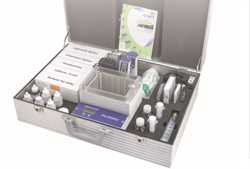
Product Name: CMT WTK-CT-80001 Marine Potable Water
Brand: CMT
Product Code: WTK-CT-80001
Tags: CMT
CMT WTK-CT-80001 Water
Potable Water
WTK-CT-80001 Water
WTK-CT-80001
WTK-CT-80001
WTK-CT-80001 Potable
CMT WTK-CT-80001 Marine Water
Marine Potable
WTK-CT-80001 Marine Water
WTK-CT-80001 Marine Potable Water
CMT Marine
Marine Water
CMT Potable
CMT WTK-CT-80001 Marine Potable Water
Marine Potable
WTK-CT-80001 Potable
CMT WTK-CT-80001 Potable
CMT WTK-CT-80001 Marine Potable
Marine Potable Water
Are you interested in the product CMT WTK-CT-80001 Marine Potable Water from manufacturer CMT with code WTK-CT-80001? Contact us now and get offer. Imtek Engineering, the fastest and most reliable industrial equipment supplier in the world, will offer you the best offer!
Get Offer With E-Mail: info@im-tek.com
Get a offer for CMT WTK-CT-80001 Marine Potable Water from our live support team now!
Improperly managed Potable water is an established route for infectious disease transmission onboard! You may now think yourself being on the safe side as onboard your vessel only bottled water is used for drinking but what about the water used for personal hygiene? What about the water used for food preparation, the water used to clean the surfaces you come in contact daily? All of it needs to be of such high quality that transmission of diseases is prevented and it needs to be available in such quantities that all types of useage can be covered. The "Guide to Ship Sanitation" issued by the WHO mentions the following hazardous elements roughly divided into two groups: Microbes that cause infectious disease or food poisoning, such as bacteria, viruses and parasites Organic and inorganic substances that may cause health hazards, such as substances that can cause acute poisoning, substances that accumulate in the human organisms causing health hazards, carcinogenic compounds and/or allergenic substances International regulations regarding the Potable Water Quality Monitoring and Control were driven by the World Health Organization (WHO) via its International Health Regulations (IHR). Soon enough adapted for on-board potable water, as part of the overall Ship Sanitation Certificate. Current International Health Regulations (2005) and ILO 178 (2009) apply to all countries/flag states that have ratified to them. The ILO Maritime Labour Convention, (MLC 2006) does apply to all seagoing vessels. Monitoring and control compliance procedures are laid out in the Guide for Ship Sanitation detailing: the systems that require monitoring, the method and frequency of monitoring the record keeping requirements The draft guidelines were created in close collaboration with the International Labour Organisation (ILO) and the International Maritime Organisation (IMO). Alongside SOLAS, MARPOL and the STCW Convention the MLC 2006 has been introduced as the fourth pillar of the regulatory regime of IMO. It will require an MLC 2006 certificate. Simple regular assessment and testing of the potable water system for microbiological activity, biocide (disinfection control) and implementing a correct control scheme (i.e. temperature monitoring), will ultimately reduce the risk of a disease and save lives. According to ILO MLC (2006), IHR (2005) and ILO 178 (2009) a qualified person is required onboard the vessel or rig to perform the test.CMT does provide a complete training for Marine Portable Water to ensure understanding the legislation and performing all test according the legislations. At the end of the training each attendee will get a certificate proving the respective qualification.